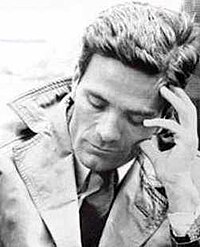Pasolini
| Pier Paolo Pasolini | |
|---|---|
 |
|
| Born |
5 March 1922 Bologna, Kingdom of Italy |
| Died | 2 November 1975 (aged 53) Ostia, Rome, Italy |
| Occupation | Film director, novelist, poet, intellectual, journalist, philosopher |
| Notable works |
Films: Accattone Arabian Nights The Gospel According to St. Matthew Teorema Salò, or the 120 Days of Sodom Literary works: Ragazzi di vita Una vita violenta |
|
|
|
| Signature | |
Pier Paolo Pasolini (Italian: [ˈpjɛr ˈpaːolo pazoˈliːni]; 5 March 1922 – 2 November 1975) was an Italian film director, poet, writer and intellectual. Pasolini also distinguished himself as an actor, journalist, philosopher, novelist, playwright, painter and political figure.
He remains a controversial personality in Italy to this day due to his blunt style and the focus of some of his works on taboo sexual matters, but he is an established major figure in European literature and cinematic arts. His murder prompted an outcry in some circles of Italy, with its circumstances continuing to be a matter of heated debate.
Pasolini was born in Bologna, traditionally one of the most leftist politically of Italian cities. He was the son of Carlo Alberto Pasolini, a lieutenant of the Italian army, and Susanna Colussi, an elementary school teacher. His parents married in 1921, Pasolini was born in 1922 and named after his paternal uncle. His family moved to Conegliano in 1923 and, two years later, to Belluno, where another son, Guidalberto, was born.
In 1926, Pasolini's father was arrested for gambling debts. His mother moved with the children to her family's house in Casarsa della Delizia, in the Friuli region. That same year, his father Carlo Alberto, first detained and then identified Anteo Zamboni as the would-be assassin of Benito Mussolini following his assassination attempt. At any rate, Carlo Alberto was persuaded of the virtues of fascism.
Pasolini began writing poems at the age of seven, inspired by the natural beauty of Casarsa. One of his early influences was the work of Arthur Rimbaud. In 1931, his father was transferred to Idria in the Julian March (now Idrija in Slovenia); in 1933 they moved again to Cremona in Lombardy, and later to Scandiano and Reggio Emilia. Pasolini found it difficult to adapt to all these moves, though in the meantime he enlarged his poetry and literature readings (Dostoyevsky, Tolstoy, Shakespeare, Coleridge, Novalis) and left behind the religious fervour of his early years. In the Reggio Emilia high school, he met his first true friend, Luciano Serra. The two met again in Bologna, where Pasolini spent seven years while completing high school: here he cultivated new passions, including football. With other friends, including Ermes Parini, Franco Farolfi, Elio Meli, he formed a group dedicated to literary discussions.
...
Wikipedia
